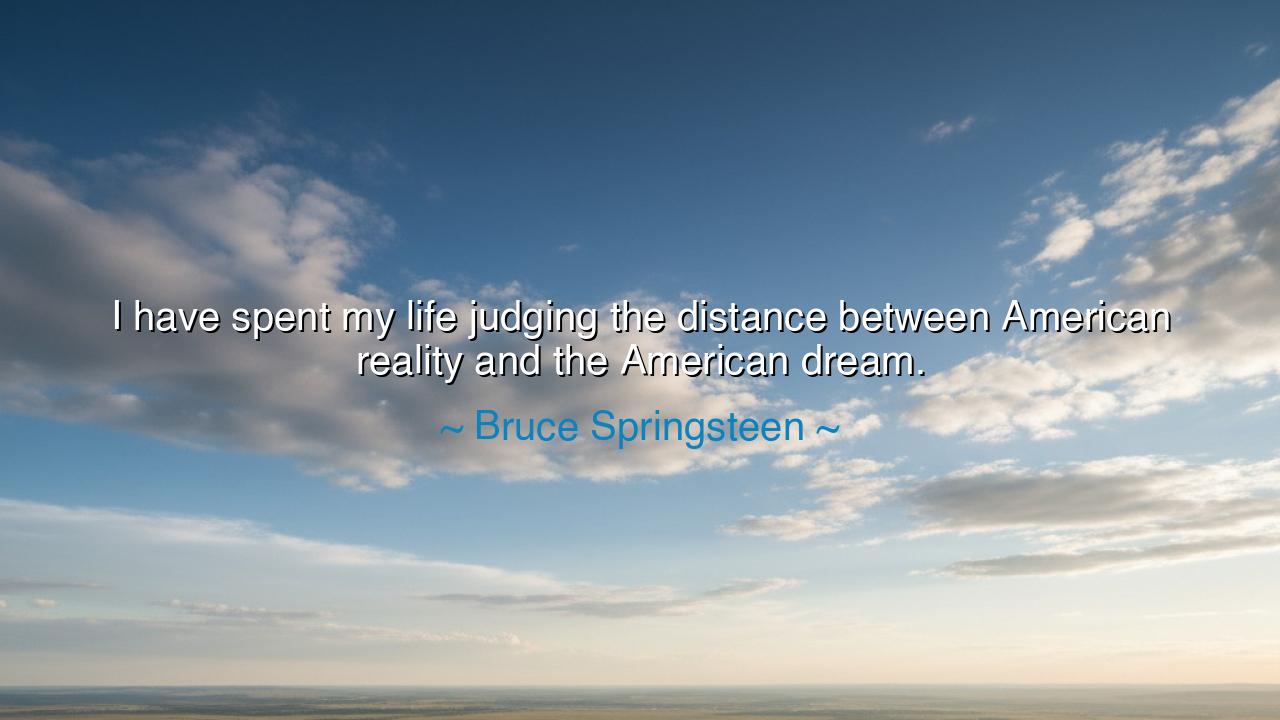
I have spent my life judging the distance between American
I have spent my life judging the distance between American reality and the American dream.






The words of Bruce Springsteen—“I have spent my life judging the distance between American reality and the American dream.”—are not the idle musings of a poet, but the confession of a prophet in song. They reveal the burden of an artist who has walked among the people, who has listened to their struggles, their hopes, their defeats, and their victories. In this statement lies the essence of his life’s work: measuring the vast gap between what America promises and what America delivers, between the shining dream of freedom and prosperity and the often harsh reality lived by its citizens.
The origin of this quote lies in Springsteen’s career as a troubadour of the working class. From the steel towns of New Jersey to the highways of the heartland, he has sung of the mechanic, the factory worker, the soldier, the farmer, the man and woman who toil yet long for something more. His music, like the folk songs of Woody Guthrie before him, has served as a mirror to a nation. When he says he has spent his life judging the distance, he means that his art is a constant weighing of truth against promise, of sweat against dream, of what America is against what America could be.
History too is filled with this tension. Consider the words of Martin Luther King Jr., who declared in his “I Have a Dream” speech that America had written a promissory note of freedom and equality, yet had given its Black citizens a check marked “insufficient funds.” This is the same distance Springsteen measures—not in oratory, but in song. Both voices cry out that the dream is noble and worthy, but the reality is often marked by inequality, injustice, and struggle. The dream inspires; the reality compels us to act.
There is something heroic in Springsteen’s lifelong pursuit of this balance. Many choose to ignore the gap, to dwell only on the dream, basking in its glory while denying the hardship that surrounds it. Others dwell only on the reality, surrendering hope and scorning ideals. But Springsteen chooses the harder path: to live in the tension, to sing of both, to keep the dream alive while never denying the pain of the real. This is the work of an artist who refuses comfort and instead embraces truth.
The meaning of the quote reaches beyond America itself. It speaks to the universal struggle of all nations and all peoples, for every society holds within itself a vision of what it longs to be, and every society also suffers from the weight of what it is. The distance between the two is where citizens live their daily lives. To ignore that distance is to deceive oneself; to recognize it is the first step toward progress.
The lesson for us is clear: we too must be judges of that distance. In our own lives, we must measure how far our reality stands from our dreams. Are we living in accordance with our values, or only speaking of them? Do we work to close the distance between justice and injustice, equality and inequality, hope and despair? For it is not enough to dream, nor is it enough to endure reality—we must strive to bring the two closer together, so that the world we live in reflects the vision we hold in our hearts.
Practically, this means refusing to become complacent. It means working in small ways and great ways to close the gap: to treat others with fairness, to fight for justice in our communities, to lend our strength to those who have less. It means never surrendering the dream, but also never ignoring the reality. Like Springsteen, we must use our voices, our actions, and our lives to keep the promise of the dream alive.
Thus, Bruce Springsteen’s words are more than autobiography; they are a torch handed down. The American dream is not yet fully born, and American reality is not yet complete. The task of every generation is to narrow the distance, to bring the promise closer to fulfillment, and to ensure that the dream is not lost in shadows but shines, at last, as a light for all.






AAdministratorAdministrator
Welcome, honored guests. Please leave a comment, we will respond soon